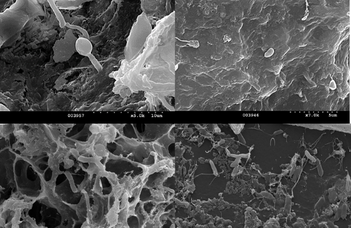
Department of Microbiology
| head of dept.: address: room: phone: fax: web page: |
Erika Tóth habil. assoc. prof. 1117 Budapest, Pázmány Péter sétány 1/C., 6.205 (+36-1) 381-2177; (+36-1) 372-2500 /8077 (+36-1) 381-2178 mikrobi.elte.hu |
|
Description of scientific area
The main research topics of the Department of Microbiology (ELTE) is connected to microbial ecology: to answer the classical questions of ecology we use cultivation (classical and special methods) as well as cultivation independent techniques (T-RFLP, DGGE, NGS) while analysing the diversity of different habitats (aquatic habitats - including extreme environments, soils, etc.). At the same time often our work is focused on applied studies (eg. degradation of xenobiotics in nature with the help of microbes, waste water treatment, composting, etc.). Microbial taxonomy (polyphasic approach) is also a part of our research fields. Teaching The Department of Microbiology offers a broad spectrum of education: students after finishing the secondary school, BSc or MSc studies can take part in different education programmes. Research topics Research topics of the Department Microbiology are connected mainly to microbial ecology using wide range of techniques (cultivation as well as cultivation independent, molecular methods, focusing on bacteria). Moreover, we have projects connected to applied microbiology.
Our colleges work in research groups within the department and often having live connections with engineers, doctors or researchers from the industry. We have strong connection with Sapientia University (Transilvania), where our colleges teach and having common research topics. In form of workshops we share our knowledge each second week (department seminars). More about the life at the Department of Microbiology you can find information at our facebook site: (https://www.facebook.com/ELTEmikrobiologiaTSZ/). Carreers At the Department of Microbiology we “develop” scientists who can work later at any field of microbiology: in the industry (e.g. food or drug industry), in the clinical fields, control laboratories or any research fields. Our students successful in Hungary as well as abroad. How to be a microbiologist? The simplest solution is to come to ELTE biology BSc then MSc on the MIM specialisation (Molecular, Immunology and Microbiology). At the end of this education there are two doctoral schools which you can try to enter: Biology and Environmental Sciences Doctoral Schools. Or after having a diploma of biological interest - you can come to special microbiologist education for 3 semesters. Where can I apply for a student work? Search for the teacher/scientist whom topics are interested for you (address of colleges are available at our website: mikrobi.elte.hu) |

